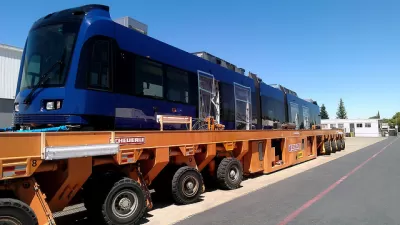With Atlanta's first new streetcar line in a century set to be completed next year, transit advocates are putting recent defeats behind them and studying how to expand the system.
With a new, $93 million, streetcar line running from Martin Luther King Jr. National Historic Site to Centennial Olympic Park currently under construction, city leaders are looking to leverage momentum and anticipated investment to expand the system throughout the city.
"Despite the failure of last summer's transportation tax vote, the city is taking steps to expand Atlanta's streetcar network that could connect more than just tourists, students, residents, and workers between Centennial Olympic Park and the King Center," reports Thomas Wheatley.
"This morning, Invest Atlanta's board approved doling out more than $1.4 million to Atlanta Beltline Inc., the nonprofit that plans and develops the 22-mile loop of parks, trails, and transit, to pay for studies to expand the city's streetcar network to North Avenue and the Beltline's Eastside Trail in the Old Fourth Ward....The board of the city's economic development agency also OK'ed funding to study a possible east-west streetcar line along North Avenue, Northside Drive, and Donald Lee Hollowell Parkway."
"The studies of the proposed routes, parts of which you might recognize from last summer's T-SPLOST project list, only cover the projects' environmental assessment," notes Wheatley. "However, once complete, the two projects could become more competitive for federal funds. A Beltline spokesman says the studies are expected to take approximately two years to complete."
FULL STORY: City to study new streetcar routes connecting to Georgia Tech, Beltline

Alabama: Trump Terminates Settlements for Black Communities Harmed By Raw Sewage
Trump deemed the landmark civil rights agreement “illegal DEI and environmental justice policy.”

Study: Maui’s Plan to Convert Vacation Rentals to Long-Term Housing Could Cause Nearly $1 Billion Economic Loss
The plan would reduce visitor accommodation by 25% resulting in 1,900 jobs lost.

Why Should We Subsidize Public Transportation?
Many public transit agencies face financial stress due to rising costs, declining fare revenue, and declining subsidies. Transit advocates must provide a strong business case for increasing public transit funding.

Wind Energy on the Rise Despite Federal Policy Reversal
The Trump administration is revoking federal support for renewable energy, but demand for new projects continues unabated.

Passengers Flock to Caltrain After Electrification
The new electric trains are running faster and more reliably, leading to strong ridership growth on the Bay Area rail system.

Texas Churches Rally Behind ‘Yes in God’s Back Yard’ Legislation
Religious leaders want the state to reduce zoning regulations to streamline leasing church-owned land to housing developers.
Urban Design for Planners 1: Software Tools
This six-course series explores essential urban design concepts using open source software and equips planners with the tools they need to participate fully in the urban design process.
Planning for Universal Design
Learn the tools for implementing Universal Design in planning regulations.
Caltrans
Smith Gee Studio
Institute for Housing and Urban Development Studies (IHS)
City of Grandview
Harvard GSD Executive Education
Toledo-Lucas County Plan Commissions
Salt Lake City
NYU Wagner Graduate School of Public Service



























